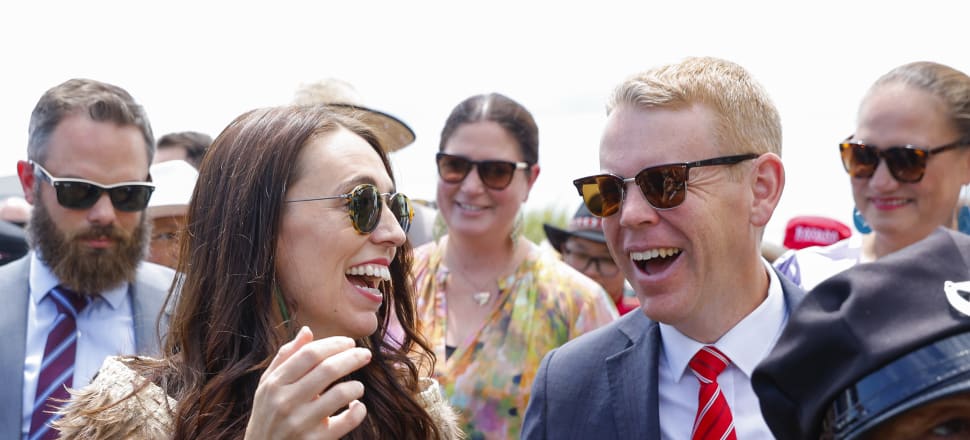
*This story was originally published on RNZ and is republished with permission*
Jacinda Ardern and Chris Hipkins are speaking at Rātana Pā in what is a de facto farewell for the outgoing Labour leader - and a test for her replacement and his connection with Māoridom.
On her final day carrying the weight of being Prime Minister, Ardern says it feels like a "really special day" predominantly because she gets to see her friend and colleague take on the mantle.
"Whilst there's been a bit of commentary in the aftermath of my departure I would hate for anyone to view my departure as a negative commentary on New Zealand.
"I have experienced such love, compassion, empathy and kindness when I've been in this job - that has been my predominant experience."
She says probably the most important advice she's given Hipkins is "You do you".
"This is for him now, it's for him to carve out his own space, be his own kind of leader, actually there's no advice I could really impart. I can share information, I can share experiences, but this is now for him."
She says she does not see Hipkins' plan to get "back to basics" as an indictment on her Government.
"You won't find me commentating on domestic politics, I've had my time, it's now for the new team."
She says she's not going anywhere and will still be the MP for Mt Albert, but she won't be in the centre of the cut and thrust of politics.
"I'm going to miss people because that's been the joy of the job and so my only words are words of thanks ... you won't see me in the House a lot.
"I'm ready to be many things, I'm ready to be a backbench MP, I'm ready to be a sister and a mum."
Hipkins says on his first official visit to Rātana as the incoming Labour leader and prime minister, the relationship between the party and the Rātana movement have always been important since TW Rātana called on Michael Joseph Savage.
He says he travelled to Rātana with Ardern.
"(It was) nice for us to get an opportunity to spend a bit of time together, an opportunity to sort of reflect on the last few years, so it's a bittersweet moment.
"I'm really honoured to be taking on the role but as is well known Jacinda's a very good friend of mine, and so it was nice to be able to be here with her."
"There are moments when it sinks in, and there are moments where it still doesn't quite feel real. I've been coming here for nearly 20 years now, my first visit was in 2004 when Helen Clark was the prime minister."
Ardern offered a few words of advice he would keep between the two of them.
"A bit of everything, we were in the car for two hours so we had time to talk about plenty."
Former Labour chief of staff Matt McCarten, of Ngāpuhi descent, told RNZ he expected it would be a "very emotional" day for both Ardern and mana whenua.
"Jacinda's had a very strong relationship with Māori ... [her departure] is a huge loss for Māoridom because she was an ally in public, but also in the backrooms."
McCarten, who also worked under David Cunliffe and Andrew Little, said Hipkins would have a different approach and focus to Ardern.
McCarten predicted Hipkins would ask some hard questions about certain policies advocated by the Māori caucus and put some on ice.
The political history of Rātana goes back to the late 1920s, when Tahupōtiki Wiremu Rātana announced that members of the church would stand in the then-four Māori seats.
They announced a formal alliance with the Labour Party in 1936, but welcome visitors from all political parties.
A 'divisive and immature' conversation
Earlier in the day, on his first visit to Rātana Pā, National leader Christoper Luxon said it was somewhere where people can "have some honest conversation with each other".
Luxon claimed the Māori economy had boomed under previous National governments, and the party had also delivered innovations alongside Māori.
"I think about Kōhanga Reo, I think about Whānau Ora, innovations that were delivered within the coherency of a single system of delivery of public service."
He acknowledged the party had work to do on diversity.
"We are a party that had a poor election result, we did not have the diversity that we want to have going forward, but I'm incredibly proud of the progress we've made and I'm proud of the candidates that we'll take to the election in 2023."
He also addressed "the big topic of the day and of the last few years - which has been that word co-governance".
"I think it has been quite a divisive and immature conversation over recent years, and I personally think it's because the Government hasn't been upfront or transparent with the New Zealand people about where it's going and what it's doing.
"We believe in a single coherent system - not one system for Māori and another system for non-Māori - for the delivery of public services. Things like health, education, and justice, and critical infrastructure like Three Waters.
"It doesn't mean that we don't want Māori involved in decision-making and partnering with Māori, we have a principal objection because New Zealand has one government: it's elected by all of us, it's accountable to all of us, and its public services are available to anyone who needs them."
He repeatedly said New Zealand had huge opportunities ahead of it, but "it will require a National government to actually get things done".
"And while we oppose co-governance of public services as just discussed I want you to know the National Party wants a New Zealand where Māori success is New Zealand's success."







